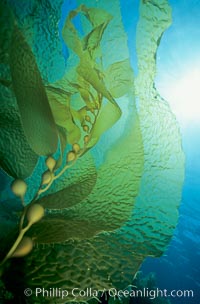
Kelp frond showing pneumatocysts.
Species: Giant kelp, Macrocystis pyrifera
Location: San Clemente Island, California
Image ID: 00627
Species: Giant kelp, Macrocystis pyrifera
Location: San Clemente Island, California
Image ID: 00627
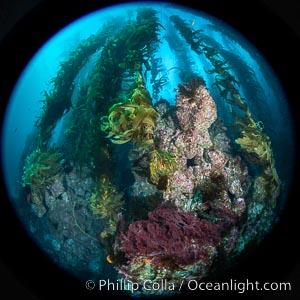
The Kelp Forest and Rocky Reef of San Clemente Island. Giant kelp grows rapidly, up to 2' per day, from the rocky reef on the ocean bottom to which it is anchored, toward the ocean surface where it spreads to form a thick canopy. Myriad species of fishes, mammals and invertebrates form a rich community in the kelp forest. Lush forests of kelp are found throughout California's Southern Channel Islands.
Species: Giant kelp, Macrocystis pyrifera
Location: San Clemente Island, California
Image ID: 38494
Species: Giant kelp, Macrocystis pyrifera
Location: San Clemente Island, California
Image ID: 38494
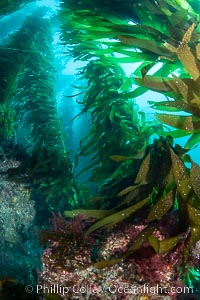
The Kelp Forest and Rocky Reef of San Clemente Island. Giant kelp grows rapidly, up to 2' per day, from the rocky reef on the ocean bottom to which it is anchored, toward the ocean surface where it spreads to form a thick canopy. Myriad species of fishes, mammals and invertebrates form a rich community in the kelp forest. Lush forests of kelp are found throughout California's Southern Channel Islands.
Species: Giant kelp, Macrocystis pyrifera
Location: San Clemente Island, California
Image ID: 38495
Species: Giant kelp, Macrocystis pyrifera
Location: San Clemente Island, California
Image ID: 38495
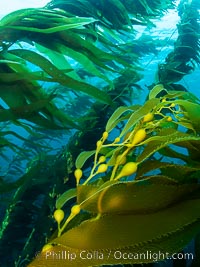
Kelp fronds showing pneumatocysts, bouyant gas-filled bubble-like structures which float the kelp plant off the ocean bottom toward the surface, where it will spread to form a roof-like canopy.
Species: Giant kelp, Macrocystis pyrifera
Location: San Clemente Island, California
Image ID: 38498
Species: Giant kelp, Macrocystis pyrifera
Location: San Clemente Island, California
Image ID: 38498
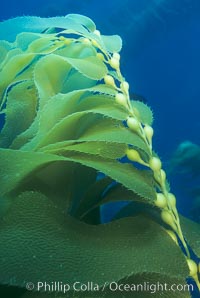
Kelp frond showing pneumatocysts.
Species: Giant kelp, Macrocystis pyrifera
Location: Santa Barbara Island, California
Image ID: 02435
Species: Giant kelp, Macrocystis pyrifera
Location: Santa Barbara Island, California
Image ID: 02435
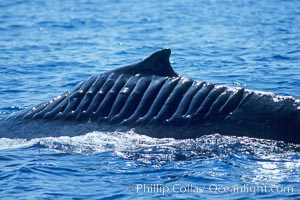
North Pacific humpback whale showing extensive scarring, almost certainly from a boat propeller, on dorsal ridge. This female North Pacific humpback whale was first seen with the depicted lacerations near the island of Maui in the Hawaiian Islands in the mid-90s, and is the original humpback to bear the name 'Blade Runner'. This female has apparently recovered, as evidenced the calf she was observed nurturing. A South Pacific humpback whale endured a similar injury in Sydney Australia in 2001, and bears a remarkably similar scar pattern to the above-pictured whale.
Species: Humpback whale, Megaptera novaeangliae
Location: Maui, Hawaii
Image ID: 05909
Species: Humpback whale, Megaptera novaeangliae
Location: Maui, Hawaii
Image ID: 05909
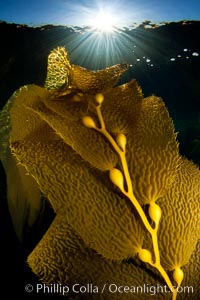
Kelp fronds and pneumatocysts. Pneumatocysts, gas-filled bladders, float the kelp plant off the ocean bottom toward the surface and sunlight, where the leaf-like blades and stipes of the kelp plant grow fastest. Giant kelp can grow up to 2' in a single day given optimal conditions. Epic submarine forests of kelp grow throughout California's Southern Channel Islands.
Species: Giant kelp, Macrocystis pyrifera
Location: San Clemente Island, California
Image ID: 25396
Species: Giant kelp, Macrocystis pyrifera
Location: San Clemente Island, California
Image ID: 25396
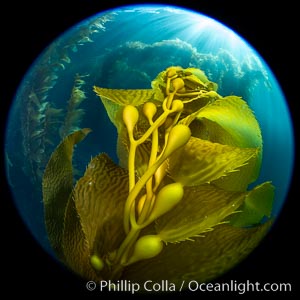
Kelp fronds and pneumatocysts. Pneumatocysts, gas-filled bladders, float the kelp off the ocean bottom toward the surface and sunlight, where the leaf-like blades and stipes of the kelp plant grow fastest. Catalina Island, California.
Species: Giant kelp, Macrocystis pyrifera
Location: Catalina Island, California
Image ID: 37282
Species: Giant kelp, Macrocystis pyrifera
Location: Catalina Island, California
Image ID: 37282
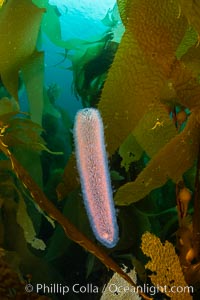
Pyrosome in Kelp Forest, Santa Barbara Island.
Species: Pyrosome, Pyrosoma
Location: Santa Barbara Island, California
Image ID: 35826
Species: Pyrosome, Pyrosoma
Location: Santa Barbara Island, California
Image ID: 35826
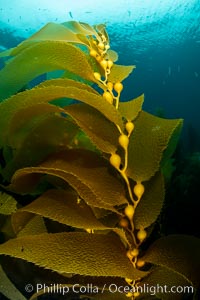
Kelp fronds showing pneumatocysts, bouyant gas-filled bubble-like structures which float the kelp plant off the ocean bottom toward the surface, where it will spread to form a roof-like canopy.
Location: Santa Barbara Island, California
Image ID: 35827
Location: Santa Barbara Island, California
Image ID: 35827
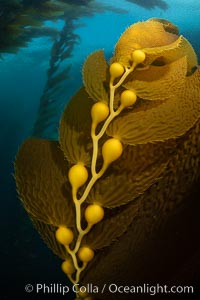
Kelp fronds and pneumatocysts. Pneumatocysts, gas-filled bladders, float the kelp plant off the ocean bottom toward the surface and sunlight, where the leaf-like blades and stipes of the kelp plant grow fastest. Giant kelp can grow up to 2' in a single day given optimal conditions. Epic submarine forests of kelp grow throughout California's Southern Channel Islands.
Species: Giant kelp, Macrocystis pyrifera
Location: San Clemente Island, California
Image ID: 37100
Species: Giant kelp, Macrocystis pyrifera
Location: San Clemente Island, California
Image ID: 37100
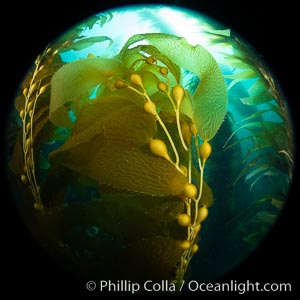
Kelp fronds and pneumatocysts. Pneumatocysts, gas-filled bladders, float the kelp off the ocean bottom toward the surface and sunlight, where the leaf-like blades and stipes of the kelp plant grow fastest.
Species: Giant kelp, Macrocystis pyrifera
Location: Catalina Island, California
Image ID: 37297
Species: Giant kelp, Macrocystis pyrifera
Location: Catalina Island, California
Image ID: 37297
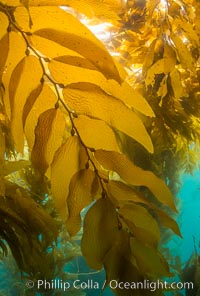
Giant kelp frond showing pneumatocysts. Small gas bladders -- pneumatocysts -- connect the kelp's stipes ("stems") to its blades ("leaves"). These bladders help elevate the kelp plant from the bottom, towards sunlight and the water's surface.
Species: Giant kelp, Macrocystis pyrifera
Location: Catalina Island, California
Image ID: 33439
Species: Giant kelp, Macrocystis pyrifera
Location: Catalina Island, California
Image ID: 33439
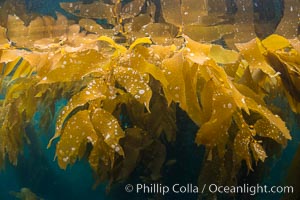
Giant kelp frond showing pneumatocysts. Small gas bladders -- pneumatocysts -- connect the kelp's stipes ("stems") to its blades ("leaves"). These bladders help elevate the kelp plant from the bottom, towards sunlight and the water's surface.
Species: Giant kelp, Macrocystis pyrifera
Location: Catalina Island, California
Image ID: 33440
Species: Giant kelp, Macrocystis pyrifera
Location: Catalina Island, California
Image ID: 33440
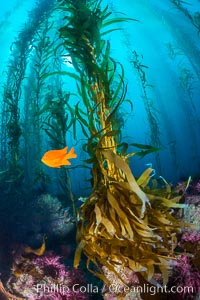
Kelp holdfast attaches the plant to the rocky reef on the oceans bottom. Kelp blades are visible above the holdfast, swaying in the current.
Location: Catalina Island, California
Image ID: 34212
Location: Catalina Island, California
Image ID: 34212
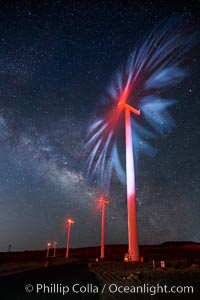
Ocotillo Wind Energy Turbines, at night with stars and the Milky Way in the sky above, the moving turbine blades illuminated by a small flashlight.
Location: Ocotillo, California
Image ID: 30239
Location: Ocotillo, California
Image ID: 30239
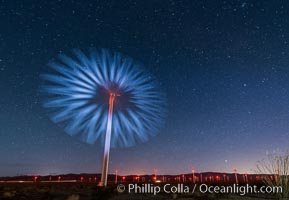
Stars rise above the Ocotillo Wind Turbine power generation facility, with a flashlight illuminating the turning turbine blades.
Image ID: 30223
Image ID: 30223
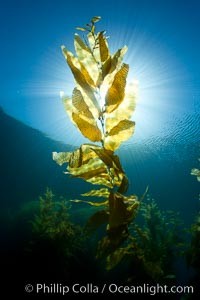
Giant kelp, blades, stipes and pneumatocysts, backlit by the sun in shallow water.
Species: Giant kelp, Macrocystis pyrifera
Location: San Clemente Island, California
Image ID: 25401
Species: Giant kelp, Macrocystis pyrifera
Location: San Clemente Island, California
Image ID: 25401
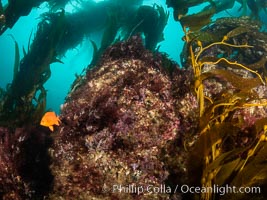
Macrocystis kelp growing up from a rocky reef, the kelp's holdfast is like a root cluster which attaches the kelp to the rocky reef on the oceans bottom. Kelp blades are visible above the holdfast, swaying in the current.
Species: Giant kelp, Macrocystis pyrifera
Location: San Clemente Island, California
Image ID: 37053
Species: Giant kelp, Macrocystis pyrifera
Location: San Clemente Island, California
Image ID: 37053
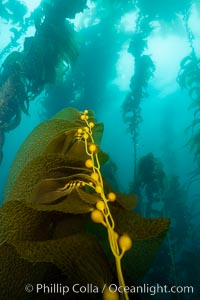
Kelp fronds and pneumatocysts. Pneumatocysts, gas-filled bladders, float the kelp plant off the ocean bottom toward the surface and sunlight, where the leaf-like blades and stipes of the kelp plant grow fastest. Giant kelp can grow up to 2' in a single day given optimal conditions. Epic submarine forests of kelp grow throughout California's Southern Channel Islands.
Species: Giant kelp, Macrocystis pyrifera
Location: San Clemente Island, California
Image ID: 37054
Species: Giant kelp, Macrocystis pyrifera
Location: San Clemente Island, California
Image ID: 37054
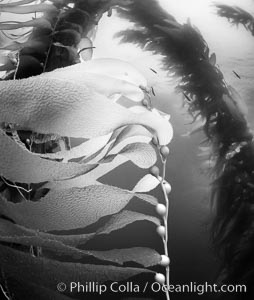
Kelp fronds and pneumatocysts. Pneumatocysts, gas-filled bladders, float the kelp plant off the ocean bottom toward the surface and sunlight, where the leaf-like blades and stipes of the kelp plant grow fastest. Giant kelp can grow up to 2' in a single day given optimal conditions. Epic submarine forests of kelp grow throughout California's Southern Channel Islands.
Species: Giant kelp, Macrocystis pyrifera
Location: San Clemente Island, California
Image ID: 37076
Species: Giant kelp, Macrocystis pyrifera
Location: San Clemente Island, California
Image ID: 37076
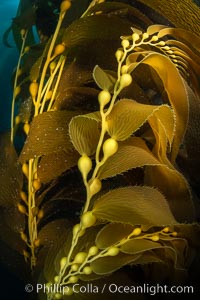
Kelp fronds and pneumatocysts. Pneumatocysts, gas-filled bladders, float the kelp plant off the ocean bottom toward the surface and sunlight, where the leaf-like blades and stipes of the kelp plant grow fastest. Giant kelp can grow up to 2' in a single day given optimal conditions. Epic submarine forests of kelp grow throughout California's Southern Channel Islands.
Species: Giant kelp, Macrocystis pyrifera
Location: San Clemente Island, California
Image ID: 37101
Species: Giant kelp, Macrocystis pyrifera
Location: San Clemente Island, California
Image ID: 37101
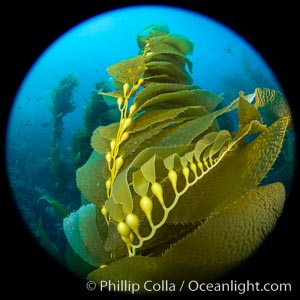
Kelp fronds and pneumatocysts. Pneumatocysts, gas-filled bladders, float the kelp off the ocean bottom toward the surface and sunlight, where the leaf-like blades and stipes of the kelp plant grow fastest. Catalina Island, California.
Species: Giant Kelp, Macrocystis pyrifera
Location: Catalina Island, California
Image ID: 37258
Species: Giant Kelp, Macrocystis pyrifera
Location: Catalina Island, California
Image ID: 37258
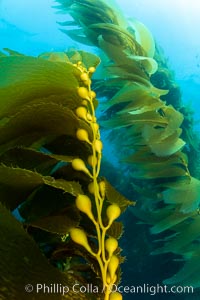
Kelp fronds and pneumatocysts. Pneumatocysts, gas-filled bladders, float the kelp off the ocean bottom toward the surface and sunlight, where the leaf-like blades and stipes of the kelp plant grow fastest. Catalina Island, California.
Species: Giant Kelp, Macrocystis pyrifera
Location: Catalina Island, California
Image ID: 37261
Species: Giant Kelp, Macrocystis pyrifera
Location: Catalina Island, California
Image ID: 37261
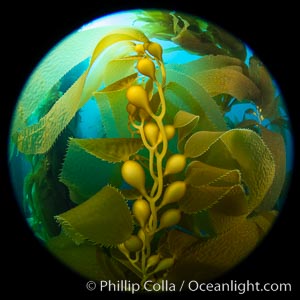
Kelp fronds and pneumatocysts. Pneumatocysts, gas-filled bladders, float the kelp off the ocean bottom toward the surface and sunlight, where the leaf-like blades and stipes of the kelp plant grow fastest. Catalina Island, California.
Species: Giant Kelp, Macrocystis pyrifera
Location: Catalina Island, California
Image ID: 37262
Species: Giant Kelp, Macrocystis pyrifera
Location: Catalina Island, California
Image ID: 37262
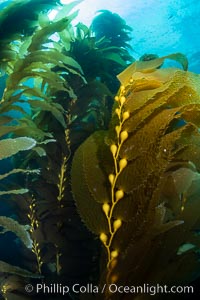
Kelp fronds and pneumatocysts. Pneumatocysts, gas-filled bladders, float the kelp off the ocean bottom toward the surface and sunlight, where the leaf-like blades and stipes of the kelp plant grow fastest. Catalina Island, California.
Species: Giant kelp, Macrocystis pyrifera
Location: Catalina Island, California
Image ID: 37275
Species: Giant kelp, Macrocystis pyrifera
Location: Catalina Island, California
Image ID: 37275
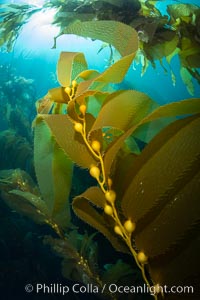
Kelp fronds and pneumatocysts. Pneumatocysts, gas-filled bladders, float the kelp off the ocean bottom toward the surface and sunlight, where the leaf-like blades and stipes of the kelp plant grow fastest. Catalina Island, California.
Species: Giant kelp, Macrocystis pyrifera
Location: Catalina Island, California
Image ID: 37277
Species: Giant kelp, Macrocystis pyrifera
Location: Catalina Island, California
Image ID: 37277
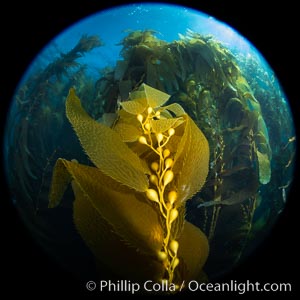
Kelp fronds and pneumatocysts. Pneumatocysts, gas-filled bladders, float the kelp off the ocean bottom toward the surface and sunlight, where the leaf-like blades and stipes of the kelp plant grow fastest. Catalina Island, California.
Species: Giant kelp, Macrocystis pyrifera
Location: Catalina Island, California
Image ID: 37278
Species: Giant kelp, Macrocystis pyrifera
Location: Catalina Island, California
Image ID: 37278
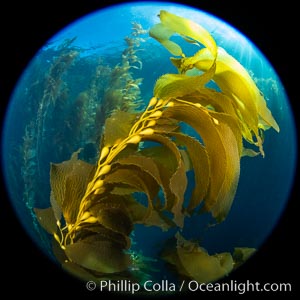
Kelp fronds and pneumatocysts. Pneumatocysts, gas-filled bladders, float the kelp off the ocean bottom toward the surface and sunlight, where the leaf-like blades and stipes of the kelp plant grow fastest. Catalina Island, California.
Species: Giant kelp, Macrocystis pyrifera
Location: Catalina Island, California
Image ID: 37281
Species: Giant kelp, Macrocystis pyrifera
Location: Catalina Island, California
Image ID: 37281
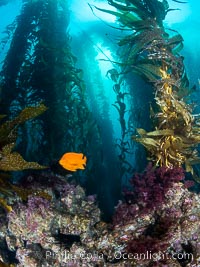
The Kelp Forest and Rocky Reef of San Clemente Island. Giant kelp grows rapidly, up to 2' per day, from the rocky reef on the ocean bottom to which it is anchored, toward the ocean surface where it spreads to form a thick canopy. Myriad species of fishes, mammals and invertebrates form a rich community in the kelp forest. Lush forests of kelp are found throughout California's Southern Channel Islands.
Species: Giant kelp, Garibaldi, Macrocystis pyrifera, Hypsypops rubicundus
Location: San Clemente Island, California
Image ID: 38513
Species: Giant kelp, Garibaldi, Macrocystis pyrifera, Hypsypops rubicundus
Location: San Clemente Island, California
Image ID: 38513